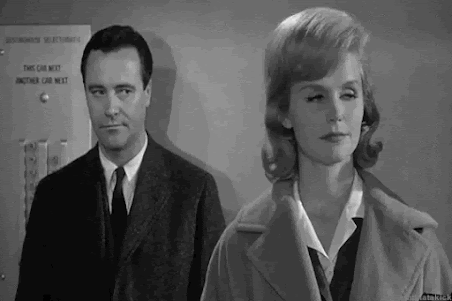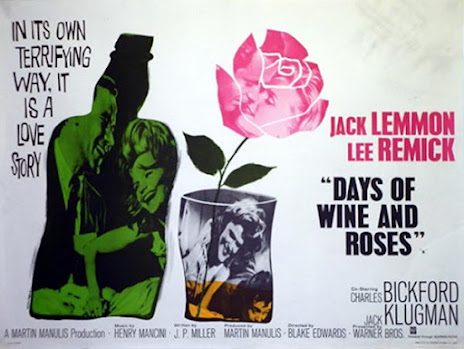Days of Wine and Roses, 1962
Director: Blake Edwards
Writers: J. P. Miller
Cinematographer: Philip H. Lathrop
Music: Henry Mancini
Producer: Martin Manulis for Jalem Productions, distributed by Warner Bros.
Starring: Jack Lemmon, Lee Remick, Charles Bickford, Jack Klugman
Why I chose it
After last week's veering into farce, I decided to once again dip into hard-hitting drama. This film had been on my radar for years as it's been on TCM a number of times, and I was curious about how difficult it was going to be to watch. As difficult as Who's Afraid of Virginia Woolf? I decided to find out.
'No-spoiler' plot overview
Joe Clay is a successful and somewhat smarmy public relations worker at a large ad firm in San Francisco. Among his important job duties is procuring women for visiting high-ranking clients and tossing back copious amounts of liquor. One evening he meets Kirsten, the teetotaling secretary in his firm and mistakenly assumes she is expected to be part of the "entertainment". Angry, she rejects his later advances, but then gives in to his courting and finds drinking may be fun after all. They get married, have a baby, but in the next few years, the drinking dominates and destroys, first Joe's career, then the marriage, and finally their mental and physical health. Joe finds AA, and Kirsten returns to her father's house, but they struggle through sobriety and relapse.
Production Background
Director Blake Edwards was a director on his way up, mostly working on TV series until the early 1960s. His first big hit was the ever-popular Breakfast at Tiffany's (1961), and after Days of Wine and Roses, he mostly helmed comedies like the blockbuster Pink Panther series. When he had the opportunity to direct this extremely serious feature film, which was originally presented in 1958 as a play on TV (teleplay) by J.P. Miller, he got megastar Lemmon to help boost the picture. (In the TV version, Cliff Robertson played Joe and Piper Laurie played Kirsten. Charles Bickford portrayed Kirsten's father in both the TV and theatrical film.)
According to the book Film: A World History by Borden, Duijsens, Gilbert, and Smith, Edwards and his two leads actually drank quite a lot during production. It's not clear if their drinking added verisimilitude to some of the most intense scenes! Both apparently also attended AA meetings and visited jails and hospitals that housed and treated drunks.
The film accrued 5 Oscar nominations, including Best Actor for Lemmon and Best Actress for Remick, but only took home Best Song for Johnny Mercer and Henry Mancini.
Some other notable film-related events in 1962 (from Filmsite.org):
- The 7th and final "Road to..." film (starring Bing Crosby, Bob Hope, and Dorothy Lamour) was released -- The Road to Hong Kong (1962). It was the last of seven escapist 'Road pictures' (beginning in 1940 with The Road to Singapore).
- 36-year-old sex symbol Marilyn Monroe was discovered dead (August 5) in the Los Angeles area in her Mexican style bungalow of an apparent drug overdose, a death the coroner ruled as "a probable suicide." She was in the midst of filming with director George Cukor in Something's Got To Give (1962).
- The action/spy film Dr. No, which launched in the UK in 1962, inaugurated the successful, long-running, and highly profitable James Bond series of action films. Based upon Ian Fleming's works, this film cast as the series' first Agent 007, unknown actor Sean Connery. Ursula Andress also starred as Honey Ryder, the first iconic Bond girl.
- Patty Duke won the Best Supporting Actress Oscar for her performance as young Helen Keller in The Miracle Worker (1962). She was the first minor (under age 18) to win a competitive Oscar.
*Special thanks to my friend Vânia for her gif image files, which I've featured throughout this post. Check out her blog at aintthatakick.tumblr.com.
 |
| Camerawork can be striking. |
- Considering Joe's initial happy-go-lucky corporate persona, who is a willing conspirator to sexist debauchery, the film rather struck me The Apartment (1960) meets The Lost Weekend (1945). The latter was a film from the 1940s showing one man's weekend battle with a serious alcohol problem, considered quite realistic and forward-thinking for the era. In some ways, the present film may be more painful because of the extended family devastation not really the focus of the earlier film.
 |
| The Apartment, anyone? |
 |
| Joe in the throes of a harrowing withdrawal. |
- The film is superb in letting us feel that all-consuming power of the bottle. Through the excellent performances, script, and cinematography we feel we are in the heads of our protagonists.
 |
| The lure of alcohol: one can have fun when drinking. |
 |
| Kirsten realizes that the bottle makes for poor company, when all is said and done. |
- This is my third film in this blog series featuring character actor (and one-time leading man) Charles Bickford. Last time we saw him was in the noir Fallen Angel (1945), and before that in Anna Christie (1930) opposite Greta Garbo. He's a good actor, and versatile, but it seems all his characters have one trait in common: they are strong and rugged. As Kirsten's father, he initially seems stern and to be feared, but we learn that he is an upstanding man who tries to help as his daughter's life spins out of control, and it's appropriate that the couple find him attractive to lean on.
- So the verdict on if I find the film hard to watch: yes, but, not as difficult as I was expecting. There surely are painful scenes: when Joe is suffering withdrawal, when the couple's daughter suffers neglect or abuse, or when they confront how much love is able to overcome addition. The choice of black and white at once sets a somber tone and helps us keep slightly distant from the horror. Considering how these issues may be filmed in the modern era (Leaving Las Vegas comes to mind), I couldn't help but feel a bit spared from the worst.
This can't be the life together that Joe and Kirsten
had envisioned.
The film can be rented to stream on a variety of the most popular streaming services, and can be purchased on DVD and Blu-Ray.
Further Reading
An excellent article on TCM.com provides interesting production tidbits, while this blogger posts a detailed comparison between the TV movie and the film.



Great write-up! This is such an excellent film, but it's not one that I've ever wanted to revisit -- it's just too harrowing. But Jack Lemmon and Lee Remick do a fantastic job. I didn't know about the teleplay -- I would really like to see it now, especially since I've been discovering more Piper Laurie performances. Thank you!
ReplyDeleteThanks for stopping by, Karen! I'm with you that I don't think I will watch this one again, although I'm glad I saw it. I was intrigued by the teleplay, too, especially as the blogger I cited said it was "tighter." And I wonder if Bickford altered his portrayal at all between the two versions.
DeleteWhich Piper Laurie performances have impressed you the most? She's an actress I haven't seen too much of outside of TWIN PEAKS (the series) and THE HUSTLER.
I saw this long, long ago, and agree it is a difficult one to watch, but so meaty and unflinching. Your assessment that it's like Lost Weekend meets The Apartment is exactly how I remember it.
ReplyDeleteAh, thanks for the validation! Once you watch enough films from that era, you start to see parallels.
DeleteI don't remember how the movie, The Apartment quite went (I did see it) &never saw Lost Weekend, (make think I should go & watch the two "again", but I still remember Days of W & R! You did do a very good job commenting/critiqueing this movie.
ReplyDeleteI've been telling my (grown)son his life sort of reminds me of the movie, and he should watch it. After a long-term relationship started with too much drinking, broke up a few years ago, he's having similar problems in a 2nd 2yr relationship. If he would watch it, I hope it helps him take a good, hard, long look at himself & his life & the destruction that can come in relationships.